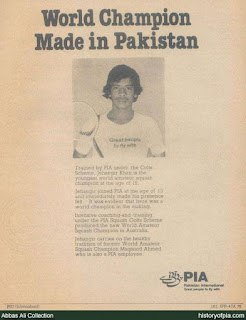LEADERSHIP LESSONS FROM THE MILITARY - Harvard Business Review (November 2010)
LEADERSHIP LESSONS FROM THE MILITARY
Harvard Business
Review (November 2010)
Reviewed by Adil Ahmad (Editor, TCS CONNECT Corporate News Magazine)
Ever since the TCS
Case Study started getting taught at the Harvard Business School, we at TCS
have begun taking a closer look at the Harvard Business Review, much to our
great good fortune!
Martial races are not uncommon in the land of the mighty Indus. The many different people who populate the
territories that Pakistan
now encompasses have in their lineage ancestors who lived the Spartan life of
warriors, and spent their waking hours in the saddle, or trekking long
distances in search of glory on the battlefield, and turning their swords into
ploughshares during times of peace.
COMPLEXITIES OF STAYING COMPETITIVE
Given such an inheritance, and faced with the complexities
of staying competitive in the modern day connected global village, I was
delighted to find the Harvard Business Review (November 2010) carry as its
cover story a series of related articles under the caption ‘Leadership Lessons
from the Military’. Naturally enough, it wasn’t the fine traditions of the
Pakistani people that prompted the article! The United States of America is the possessor
of the most powerful and technologically advanced military machine in the world.
Hence the cover story was not out of place. A host of experts contributed to
the wisdom that it contained. Amongst them Jeff Weiss, Aram Donigan, Jonathan
Hughes, Admiral Thad Allen, Boris
Groysberg, Andrew Hill, Toby Johnson, and Michael Useem.
RISKY, PRESSURED, FAST CHANGING
The pull-quote on the cover encapsulated well the linkage
between the military and corporate environments. “Military work is risky,
pressured, and fast changing. It calls for seemingly contradictory
capabilities. An absolute clarity of the mission at a high level, coupled with
an extraordinary adaptability on the ground, and a knack for managing complex,
technically precise systems. These are the same skill sets that companies today
need to prevail in a climate of intense economic uncertainty.”
ACT FAST, PROJECT CONTROL
The coauthors contend that business leaders today report
feeling that they must constantly negotiate to extract complex agreements from
people with power over industries or individual careers. Sensing that they are
in continual danger makes them want to act fast, project control even when they
don’t have any, rely on coercion, and diffuse tension at any cost. The end
result may be a compromise that fails to address the real problem or
opportunity, increases resistance from the other side that makes agreement
impossible, creates resentment that sours future negotiations, fails to develop
relationships based upon mutual respect and trust, or generates agreement that
creates enormous exposure to future risk.
SYSTEMATICALLY BUILD TRUST AND COMMITMENT
To avoid these dangers say the coauthors, executives can
apply the same strategies used by well trained military officers in hotspots
like Afghanistan and Iraq .
These negotiators solicit others points of view, propose multiple solutions,
invite their counterparts to critique them, use facts and principles of
fairness to persuade the other side, systematically build trust and commitments
over time, and take steps to reshape the negotiation process as well as the
outcome. Tall order by any yardstick! and not very successfully implemented by
the results that have been brought forth before the world in Iraq and Afghanistan .
CREATE UNITY OF EFFORT
Retired Admiral Thad Allen was with the US Coast Guard, and
the national incident commander for the Deepwater Horizon oil spill. He says
that when faced with a complex, fast moving crisis, leaders must constantly
adapt their mental models and create a unity of effort. “In the military you
have total unity of command. In a civil emergency that chain of command doesn’t
exist. You have to aggregate everybody’s capabilities to achieve a single
purpose, taking into account the fact that they have distinct authorities and
responsibilities. That’s creating unity of effort rather than unity of command,
and it’s a much more complex management challenge.”
CREATE SHARED VALUES
“You have to understand at a very large macro level what the
problem is that you’re dealing with, and what needs to be done to achieve the
effects you want, and you have to be able to communicate that. You also have to
create a set of shared values that everybody involved can subscribe to. With
Hurricane Katrina it was clear to me after 24 hours in New Orleans that we weren’t dealing only with
a natural disaster. Under the hurricane response model resources are provided
to the local government which then applies them and runs the response. But we
had lost continuity of government in New
Orleans . There was no functional local government that
could take the resources and apply them to the mission. So the mental model
became more like the response to a weapon of mass destruction. When I realized
that, things started happening. We focused on providing security and creating
the capacity of local government to do its job like de-watering the city, doing
house to house searches, and so forth.”
PUBLIC PARTICIPATION
Allen says that social media and the 24/7 news cycle are
part of a fundamental change in our sociological structure, and there will
never again be a major disaster that wont involve public participation. Public
participation will happen whether it’s managed or not. Allen blogs and tweets
regularly.
FLEXIBILITY, AGILITY AND CURIOSITY
On the subject of whether military trained personnel make
for good business managers, Allen says that they do so long as they are not too
doctrinaire about anything. “If you’re too caught up in military protocol then
you won’t be flexible in dealing with folks who are not in the military. On the
other hand, if you’re so captivated by the private sector and running
everything against a balance sheet, you can become too much of an ideologue. Good
leadership requires flexibility, agility and curiosity. If you have those then
I think it’s possible to cross over both ways.”
OPTIMIZE WHAT YOU CAN DO
When asked whether he is a born leader or has learned
something over the years, Allen says everybody can be a better leader. “You
should focus on trying to optimize what you can do with the skills and talent
that you’ve got. The more you’re a lifelong learner, and the more
intellectually curious you are, the bigger the base of potential you’ll have to
build on when the opportunity presents itself. It also makes you better at
recognizing opportunity.”




Comments
Post a Comment